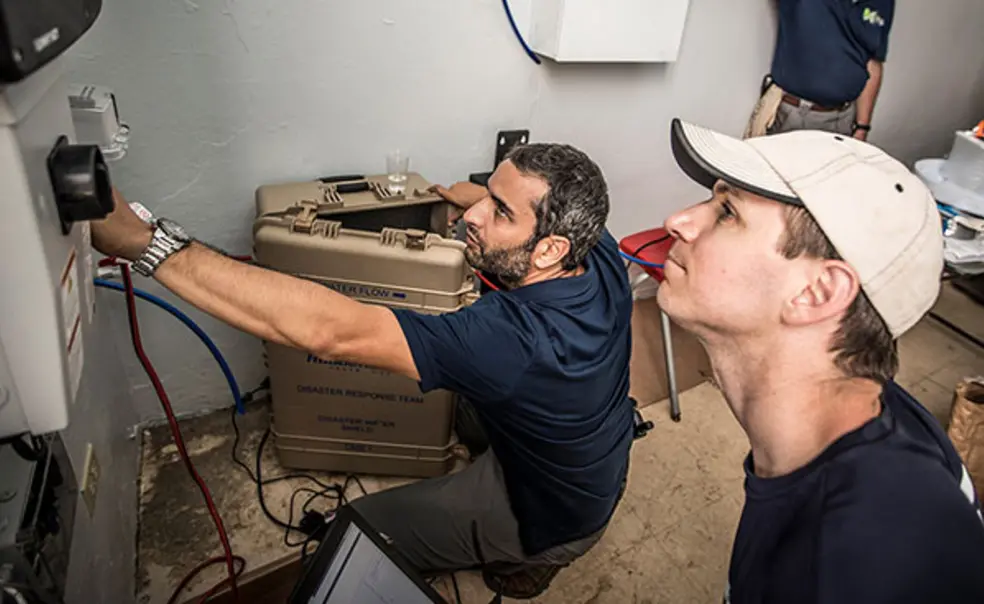Engineer Erik Limpaecher ’01 Powers Clean Water Project in Puerto Rico
For the island of Puerto Rico, restoring infrastructure after the destructive effects of Hurricane Maria continues to be a daunting task. But the immense challenges have spurred innovation that could improve future responses to natural disasters. In Loíza, a coastal city east of San Juan, the Boys & Girls Club received a new solar-powered water purification system, designed with the help of alumnus Erik Limpaecher ’01, who leads the energy research group at MIT’s Lincoln Laboratory. Limpaecher plans to return to Puerto Rico later this month with partners from Infinitum Humanitarian Systems (IHS) to work on two more water purification projects.
Limpaecher’s Lincoln Laboratory group primarily designs power systems for the U.S. military — durable off-grid systems made for war zones. After Maria struck Puerto Rico in late September, colleagues asked Limpaecher to explore ways in which his group could aid the humanitarian response. After considering needs such as emergency lighting and power for communications, they landed on water purification.
READ MORE Arielle Patrick ’12 Finds Her Niche in Public Relations
Relief groups were bringing plane-loads of bottled water to San Juan, but with roads and bridges heavily damaged, getting supplies to those in need proved difficult. Limpaecher visited one community where the lone supply line consisted of a shopping cart on a rope strung across a river. “It’s obvious that water is important,” he said, “but I didn’t realize until now how challenging it is to meet the basic water needs of 3.4 million people.”
IHS, with backing from the Rodenberry Foundation, a philanthropic group founded by the family of Star Trek creator Gene Rodenberry, had developed a water purifier for disaster recovery, powered by a portable generator. Limpaecher proposed a solar-powered version, eliminating the need for scarce fuel.
Limpaecher’s group adapted a solar inverter to work with the water purifier and selected flexible, rolled-up silicon solar arrays that would be resistant to future storm damage. With a brief round of testing at MIT and what Limpaecher calls “field-expedient engineering” on site, the team had the purifier up and running in late October, producing more than 800 gallons of clean drinking water each day (enough for about 600 people).
“Because this was our first rapid-prototyping effort and our first disaster deployment, it was a real challenge to have it all come together,” Limpaecher said. “There’s a lot of stress, but now that it’s behind us … it’s really rewarding.”
Limpaecher’s career in energy systems began at Princeton, where he and his friends co-founded a company, Princeton Power Systems, as undergraduates. He worked there for 10 years before leaving for a different type of start-up opportunity at Lincoln Laboratory, a Department of Defense-sponsored research center that has a strong reputation for its work in applied engineering. The lab had just begun an energy initiative, which Limpaecher joined as the first full-time employee. He now heads the 30-person energy research group.
When working on military logistics, Limpaecher has to consider “mission weight” (essentially “how much stuff a unit needs to schlep in and schlep out,” he said). Applying that kind of calculation in disaster response makes solar-powered water purification look quite compelling, compared to supplying bottled water. With help from private donations, the IHS-Roddenberry Foundation-MIT Lincoln Laboratory team will install at least two more systems at Boys & Girls Clubs in Puerto Rico later this month.
In the future, Limpaecher hopes to add capabilities to the purifier system, such as energy storage, and share the project’s findings with FEMA and the Department of Homeland Security, to figure out how the purification system could play a role in responding to other large-scale, long-term disasters.
READ MORE: Solar-Powered Water Purifier Is Serving 600 Puerto Ricans Every Day (Lincoln Laboratory)
WATCH: Video of the water-purification project in Loíza
Courtesy of IHS and the Roddenberry Foundation












1 Response
Norman Ravitch *62
8 Years AgoI am glad to see scientists...
I am glad to see scientists and other competent people taking a strong interest in the plight of Puerto Rico. The real story about Puerto Rico has not been told. It is a third-world country which gains very little from its legal position as part of the United States -- except in the ability of its people, American citizens, to leave the forsaken island for Florida or New York for a real American life. America has had Puerto Rico for about 120 years; it would perhaps have been better treated by a Spanish government interested in showing it could rule a colony in a decent manner, even though all the other Spanish colonies, save for a tiny one in North Africa, were happy to break with Spanish rule.
We deplore what the hurricane did to Puerto Rico but had the Island been properly ruled for a century, the damage might have been like that of the American states on the Gulf.